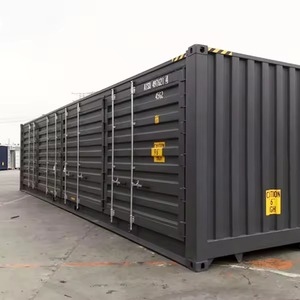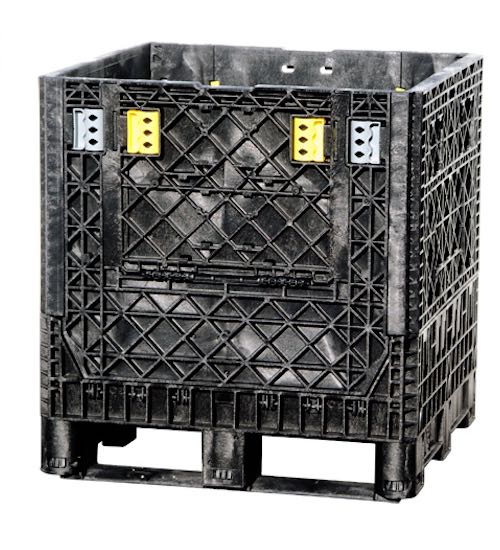Discover how industries save costs with refurbished bulk containers for everyday use
Why Bulk Containers Are Crucial for Sustainable and Cost-Effective Transport
Bulk containers play a necessary duty in modern logistics. They help with the reliable activity of large amounts of goods, consequently optimizing transportation processes. This technique not just lowers costs yet also reduces environmental influence through lower discharges and waste generation. As sectors look for more sustainable techniques, the fostering of mass containers is ending up being progressively considerable. What ramifications does this shift hold for future logistics and supply chain administration?

The Advantages of Using Mass Containers in Logistics
Bulk containers change logistics by improving efficiency and sustainability. These containers enable the transportation of large quantities of goods in a single trip, substantially reducing the number of trips needed. This not just improves operations but also reduces labor costs connected with handling, loading, and dumping. In enhancement, bulk containers are created to maximize area application within transportation cars, ensuring that even more items can be delivered concurrently.
The standardization of mass containers likewise simplifies the logistics procedure. With uniform measurements, they can be conveniently stacked and saved, resulting in boosted warehouse monitoring. Additionally, mass containers usually include durable materials that protect materials from damages during transportation, therefore lowering item loss and raising general reliability. Therefore, companies can experience improved supply chain efficiency, inevitably resulting in increased success and client fulfillment. This combination of factors makes bulk containers a vital possession in modern logistics.
Ecological Effect: Decreasing Waste and Carbon Footprint
As markets progressively focus on sustainability, the fostering of bulk containers has become a key approach for lowering waste and decreasing carbon impacts. These containers minimize using product packaging products, such as boxes and plastic, therefore significantly decreasing overall waste generation. By settling deliveries, bulk containers boost transport effectiveness, permitting for more items to be moved per journey. This decrease in trips directly correlates with lower greenhouse gas discharges, adding to a smaller carbon impact.
Bulk containers can usually be recycled or reused, better alleviating environmental influence. The longevity of these containers warranties they can withstand several transportation cycles, reducing the need for single-use options. used bulk containers. By improving logistics and advertising effective resource use, mass containers not only sustain lasting methods yet likewise motivate industries to line up with global environmental goals. Eventually, their execution shows a commitment to ecological stewardship and liable source monitoring
Expense Financial Savings: Just How Bulk Containers Lower Transportation Costs
While numerous business look for means to enhance their profits, using mass containers offers a considerable chance for reducing transportation costs. Bulk containers take full advantage of the volume of products moved, permitting businesses to deliver larger amounts at the same time. This effectiveness lowers the variety of journeys called for, straight decreasing gas prices and decreasing labor expenses connected with loading and dumping.
Furthermore, bulk containers often feature structured layouts that optimize area application within transportation automobiles. This suggests fewer voids, causing extra efficient usage of available capability. Furthermore, the durability of mass containers can reduce the danger of item damage throughout transit, making certain and decreasing losses that more items show up undamaged.
Enhancing Supply Chain Effectiveness With Mass Storage Space Solutions
Bulk storage space options play a vital function in improving supply chain efficiency by enhancing stock management. By consolidating items right into less, bigger containers, businesses can considerably lower dealing with prices related to constant transfers and processing. This streamlined method enables for better tracking and monitoring of stock, inevitably resulting in boosted operational performance.
Structured Inventory Monitoring
Efficient supply administration is necessary for maximizing supply chain procedures, particularly when companies take on bulk storage space services. These remedies enable companies to preserve higher stock degrees while lessening the regularity of replenishment. By combining materials right into mass containers, business can simplify their stock processes, minimizing the complexity connected with tracking numerous smaller sized packages. This strategy assists in precise inventory counts and boosts projecting accuracy, enabling for even more educated decision-making. On top of that, mass storage space options streamline storage facility company, making it less complicated to locate and access products when required. Therefore, organizations can accomplish an extra effective stock turnover rate, ultimately enhancing total supply chain efficiency and reducing the possibility of stockouts or overstock situations.

Reduced Handling Prices
The implementation of mass storage space remedies not only improves inventory monitoring but additionally considerably minimizes managing prices throughout the supply chain. By combining products right into mass containers, companies reduce the need for constant handling and transfer between different storage and transportation units. This approach cuts down on labor costs connected with loading, dumping, and relocating smaller plans. Furthermore, bulk storage space reduces the frequency of deliveries, leading to reduced transport expenses and reduced fuel consumption. Therefore, companies can maximize their logistics operations, permitting an extra reliable allotment of resources. Ultimately, reduced taking care of prices contribute to boosted overall supply chain performance, cultivating an environment that supports both sustainability and financial viability.

Adaptability of Mass Containers Throughout Different Industries
Although lots of sectors have unique needs for transportation and storage space, mass containers have actually arised as a flexible service that fulfills a wide variety of demands. These containers, varying from big containers to specialized tanks, can suit varied products, consisting of granules, powders, and liquids. In the farming market, mass containers facilitate the transportation of grains and plant foods, while the food and drink market utilizes them for components and completed items. The chemical sector counts on bulk containers for safely moving harmful products, guaranteeing compliance with safety laws. In addition, building and construction companies benefit from mass containers for moving accumulations and other products. Their versatility includes numerous settings of transportation, including trains, trucks, and ships, enhancing logistical performance. This convenience not only streamlines operations throughout various sectors however also advertises sustainability by lowering packaging waste and optimizing room in transit. Bulk containers play an essential function in contemporary supply chain management.
Future Trends wholesale Container Usage and Sustainability
The future of bulk container use is increasingly formed by cutting-edge products development that boosts sustainability. Additionally, automation in logistics guarantees to enhance operations, lowering waste and enhancing efficiency. Welcoming round economic situation practices will better reinvent how bulk containers are created, used, and recycled, promoting a much more lasting transport landscape.
Ingenious Products Advancement
As sectors increasingly focus on sustainability, ingenious products advancement wholesale containers becomes a considerable factor in boosting environment-friendly transport remedies. Scientists and makers are discovering naturally degradable plastics, recycled composites, and lightweight steels to reduce environmental influence. These materials not just decrease waste however additionally improve fuel performance by lowering the overall weight of containers. Furthermore, improvements in smart products, which can adjust to differing conditions, enhance the durability and capability of mass containers. The assimilation of these innovative products aligns with round economy concepts, promoting reuse and recycling. As the need for lasting techniques grows, the development of such materials will certainly play a vital role fit the future of mass container use in logistics and transportation.
Automation in Logistics
Substantial innovations in automation are poised to transform logistics and the usage of mass containers, boosting sustainability in transportation. Automated systems, consisting of drones and independent vehicles, are enhancing the movement of mass containers, reducing the reliance on typical fuel-powered transportation. These modern technologies enhance routing and filling procedures, enhancing and reducing vacant miles fuel effectiveness. In addition, automated supply monitoring systems boost tracking and surveillance of bulk containers, making certain better source allocation and decreased waste. The assimilation of the Net of Points (IoT) enables real-time data analysis, making it possible for proactive decision-making that lines up with sustainability objectives. As automation proceeds to evolve, it is anticipated to drive better developments wholesale container use, inevitably supporting even more sustainable logistics practices and lowering the environmental impact of transport.
Circular Economic Climate Practices
Improvements in automation are establishing the stage for a more incorporated method to round economic situation practices in the domain of mass container usage. As industries progressively welcome sustainability, bulk containers are being made for long life and reusability. This change not just reduces waste but additionally boosts source effectiveness. Business are taking on techniques such as closed-loop systems, where made use of containers are accumulated, refurbished, and reestablished into the supply chain. In addition, clever modern technologies track container life process, facilitating much better management and minimizing ecological influence. The partnership between makers, logistics companies, and end-users is necessary in establishing criteria for lasting container use. used plastic containers. Future patterns show a growing emphasis on products that are naturally degradable and recyclable, additional reinforcing the round economy's concepts in bulk transport

Regularly Asked Concerns
What Materials Are Bulk Containers Generally Made From?
Bulk containers are normally created from durable products such as high-density polyethylene, steel, cardboard, and aluminum. These products provide defense, versatility, and stamina, making them suitable for transferring various goods in different sectors efficiently.
Just how Do I Pick the Right Size Bulk Container?
Picking the best dimension bulk container involves evaluating the volume of materials to be transported, taking into consideration taking care of equipment compatibility, and evaluating storage space requirements. Correct dimension assurances efficiency in transport and minimizes waste throughout shipment.
Are Mass Containers Reusable or Recyclable?
Bulk containers are commonly recyclable, made for several trips, improving sustainability. Several can also be reused, depending on the materials utilized. Picking recyclable alternatives even more reduces and supports ecological goals waste in transport methods.
What Safety And Security Laws Relate To Mass Container Transport?
Security regulations for bulk container transport consist of conformity with the Department of Transportation guidelines, correct labeling of harmful materials, architectural integrity assessments, and adherence to weight limits to ensure safe handling and avoid crashes throughout transit.
Just How Can Companies Transition to Using Bulk Containers Properly?
Organizations can transform to bulk containers by evaluating present logistics, training staff on handling, buying ideal equipment, enhancing supply administration, and working together with providers to assure compatibility and performance throughout the supply chain.
As industries significantly prioritize sustainability, the adoption of bulk containers has actually emerged more info as a key strategy for minimizing waste and lowering carbon impacts. By combining materials into mass containers, business can simplify their supply processes, reducing the intricacy linked with tracking several smaller plans. As markets significantly prioritize sustainability, innovative products advancement in bulk containers arises as a substantial factor in boosting environmentally friendly transportation solutions. Automated systems, including drones and independent automobiles, are improving the movement of mass containers, decreasing the dependence on traditional fuel-powered transport. Furthermore, automated stock management systems improve tracking and surveillance of bulk containers, guaranteeing far better resource allocation and lowered waste.